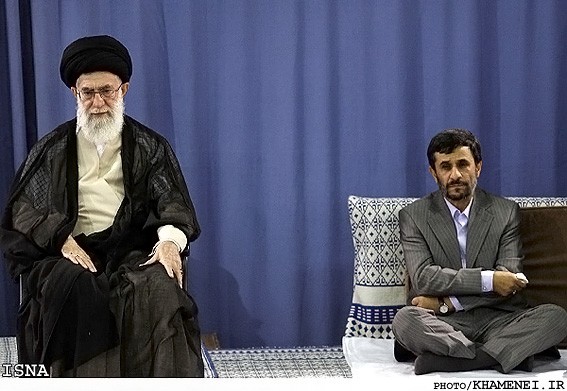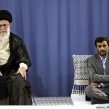Special Commentary: Iran’s War of Words with the GCC Heats Up
By:

Executive Summary
The Islamic Republic of Iran holds a strategic position in the middle of the Arab world in light of the popular uprisings occurring throughout the region. It is not surprising that Iran has been accused of meddling in its neighbors’ affairs given the stances it has taken in supporting some of the revolutionary movements. However, Tehran seemingly did not inspire or instigate any protests considering the Ahmadinejad regime’s incoherent strategy in dealing with the uprisings, especially among Gulf Cooperation Council (GCC) neighboring states to the south. Nevertheless, Tehran’s reach has in fact been felt throughout the region. Perhaps the most important Arab opposition movement to Iran is that in Bahrain, where the majority of the protestors are Iran’s Shia co-religionists. There have been calls from hard-line Iranian figures to assist the Bahraini opposition in the face of Saudi military intervention, but Tehran has yet to act. On April 15, Tehran made its boldest step thus far, asking the UN to take “firm and immediate measures” against the Bahraini government for its crackdown on the Shia opposition movement. Despite that statement and Ahmadinejad’s undiplomatic urging of the GCC to fear the consequences of hounding Iran, reformists within in Iran have still been critical of Ahmadinejad’s “passivity” in the face of Arab accusations of Iranian meddling. Ultimately, there are differing interpretations inside Iran over how Tehran should handle the unfolding crisis to its south or if it should act at all. In light of the conflicting factions within the Iranian regime, both hard-line and reformist voices are unsure about how Tehran should position itself vis-à-vis the Arab revolutions.
Introduction
On April 15, Tehran asked the UN to take “firm and immediate measures” against the Bahraini government for its crackdown on that country’s opposition (Press TV, April 15). This step represented Tehran’s most bold action against the ruling Al Khalifa family in Manama and its Arab supporters since the anti-regime protests in Bahrain first broke out in mid-February.
While the Iranian appeal to the UN might suggest a toughening of Tehran’s stance in support of its Shia co-religionists who comprise the bulk of the Bahraini opposition, a closer look at the debate in Tehran points to the reality of differing interpretations about Iran’s options and how it should handle the unfolding crisis with its southern Arab neighbors in the Gulf Cooperation Council.
The Debate in Tehran
What is apparent is that the political elite in Tehran are in a pickle about how Iran should respond to Arab charges that it is instigating unrest in Arab countries. This discussion is largely along the lines of whether the country should act more forcefully against its southern neighbors in the Gulf Cooperation Council or if it should cease any rhetorical bravado and instead set out on a course that can secure measureable benefits for Iranian national interests at a time of great regional political flux.
The public face of the debate is largely along the fault line that divides the Ahmadinejad government from reformist parliamentarians and those aligned with the Green opposition movement. Beneath the surface, however, the issue is more complex. A number of hard-line figures have been critical of what they see as Iranian submissiveness in the face of the Saudi military intervention in Bahrain in support of the Sunni Khalifa government. One such voice was that of Ruhollah Hosseinian, a parliamentarian who urged the Iranian armed forces to prepare to counter Saudi Arabia in Bahrain and elsewhere in the Persian Gulf region (Press TV, April 11).
However, calls for specific Iranian action, such as intervening militarily, have been few and far between. Instead, Iranian officials and state-controlled media have been far better apt to stick to a two-pronged message on the regional propaganda battle.
In essence, Tehran wants it both ways: to claim that the Islamic Republic is the inspiration for the regional opposition movements that are challenging the status quo from Libya to Bahrain and yet maintain that Tehran is not after meddling in the internal affairs of Arab States. Somewhere along the line the inconsistencies in this official Iranian narrative becomes unsustainable. At least that is view of critics of the Ahmadinejad administration.
Two weeks ago, President Ahmadinejad dismissed a historically unprecedented GCC statement against Tehran as “worthless” and urged the “Arab States and America to look at the map to see who they are hounding” and fear the consequences (Khabar Online, April 5). On the surface, this sort of language might seem like a robust response to the GCC, but in Tehran it was widely perceived to be undiplomatic. It also proved that Iran does not have a coherent strategy to deal with its GCC neighbors.
Iranian Diplomacy, a prominent Iran-based outlet that provides news and analysis on foreign affairs, quoted a former top diplomat as saying that Ahmadinejad had been “harsh,” “especially in accusing the (GCC) countries of surrendering to foreign countries (the U.S.).” (Iranian Diplomacy, April 12).
This former Iranian ambassador to the Organization of Islamic Conference was underlying the fact that Ahmadinejad’s administration has been constantly taunting GCC rulers as “Western lackeys” who will be swept aside as part of the popular Arab uprisings while at the same time telling these Arab rulers that they have nothing to fear from the Islamic Republic. This blatant contradiction is obvious but remains in effect at the heart of Tehran’s approach to most of the GCC states as they face a period of extraordinary turbulence.
Rhetoric vs. Specifics
Iran’s policy inconsistencies and lack of a strategic blueprint to handle GCC charges can not be attributed solely to the incompetence of the Ahmadinejad administration. In fact, it appears that due to domestic political rivalries even many reformist voices in Tehran are unsure about how Tehran should position itself vis-à-vis Arab revolutions.
For example, Mostafa Kavakebian, a reformist parliamentarian, lambasted the president for his “passivity” in the face of Arab accusations of Iranian meddling. But the parliamentarian’s comments also showed that he was less interested in helping bring about a coherent and stronger Iranian policy and more after scoring political points against Ahmadinejad. Kavakebian argued that at the moment there are two schools of thought in the Iranian regime about events in the Middle East.
Accordingly, the Office of the Supreme Leader Ayatollah Ali Khamenei believes popular uprisings in the region are tantamount to an “Islamic Awakening” and represent opportunities for Iranian activism to shape the outcome of the revolution. The other school of thought, that Ahmadinejad is said to subscribe to, sees the upheaval in Arab states as instigated by the U.S. with the aim of strengthening Western and Israeli positions in the Middle East (Iranian Diplomacy, April 13). If such diametrical interpretations of regional events exist at the top ranks of the regime in Tehran, then it is hardly surprising that Iran is lacking a single strategic blueprint to deal with the GCC States.
Meanwhile, former Iranian diplomats and officials who served largely in the reformist administration of President Mohammad Khatami (1997-2005) have been arguing Iran’s case from an entirely different angle. These seasoned observers are effectively making the case that Tehran should take advantage of Arab anxieties and push for concessions at a time when GCC states might be more forthcoming to Iran’s demands as a way to mitigate against its capacity to meddle in their affairs. For example, the recent decision by the United Arab Emirates to delay its dispute with Iran over three islands in the Persian Gulf was touted as a sign of an opportune moment to strike deals with GCC countries.
As early as mid-March, Hossein Alaei, the former head of the Iranian naval forces, gave an elaborate blueprint for how Iran can take advantage of the situation. Alaei’s argument was that Tehran should establish three new towns on the three islands (Abu Musa, Greater Tunb, Lesser Tunb) that can become home to 50,000 Iranians. In his proposal, “such foundational work” and turning the islands into Iranian “economic interests” will make it harder for the UAE to continue to claim the islands, particularly as it is “worried primarily about its internal stability and knows that if Tehran chooses to propagate against the Emirati government then it can further undermine the political stability in the UAE” (Iranian Diplomacy, March 15).
What is apparent is that there is a lot of head-scratching in Tehran at the moment about what tangible action Iran should take in the face of popular unrest in Bahrain and elsewhere in the Arab world. Domestic factional rivalries are seemingly exacerbating the inability to push ahead with a consistent message to the GCC States and beyond about Iran’s intentions. This reality represents a diplomatic problem for Iran, reflected in the angry communiqués issued by the GCC States. At the heart of this Iranian failing lies the regime’s predicament about whether Tehran should pursue material national interests or if it should always act as a champion of Arab revolutionaries.
Alex Vatanka is a scholar at the Middle East Institute in Washington D.C., where he focuses on Iran. He also lectures as a Senior Fellow in Middle East Studies at the U.S. Air Force Special Operations School (USAFSOS).




